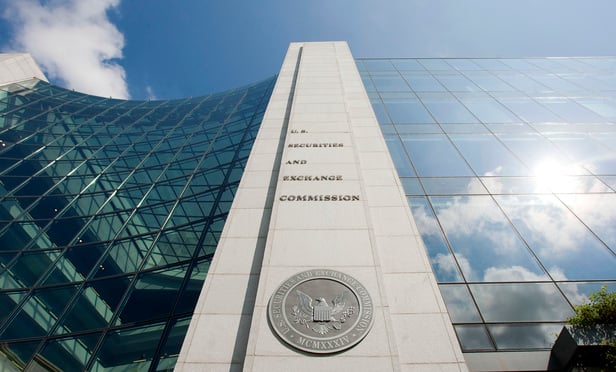
 U.S. Securities and Exchange Commission building in Washington. Sept. 4, 2014. (Photo: Diego M. Radzinschi/ALM)
U.S. Securities and Exchange Commission building in Washington. Sept. 4, 2014. (Photo: Diego M. Radzinschi/ALM)
On June 5, 2019, the Securities and Exchange Commission adopted a rulemaking package that is applicable to investment advisers and broker-dealers. The package includes two final rules and two interpretations — Regulation Best Interest, Investment Adviser Standard of Conduct Interpretation, Form CRS – Relationship Summary, and Solely Incidental Broker-Dealer Exclusion Interpretation. This is the fourth in a series of articles describing the SEC's rulemaking package.
Section 202(a)(11)(C) of the Investment Advisers Act of 1940 excludes from the definition of "investment adviser" a broker-dealer who provides investment advice that is "solely incidental to the conduct of his business as a broker or dealer and who receives no special compensation."
As summarized by the SEC, this language illustrates that Congress knew when it passed the Advisers Act that it is not uncommon for broker-dealers to provide investment advice in the course of their business. Congress also acknowledged that the provision of such limited advisory services by broker-dealers should not (generally) subject them to regulation under the Advisers Act.
As the financial services industry has evolved, application of this exclusion has become more difficult to interpret. This uncertainty was confirmed by comments the SEC received during the rulemaking process. Thus, the SEC issued this interpretation to confirm and clarify when a broker-dealer's performance of advisory activities causes it to become an investment adviser under the Advisers Act.
As a starting point, the SEC explains in the interpretation that "whether advisory services provided by a broker-dealer satisfy the solely incidental prong is assessed based on the facts and circumstances surrounding the broker-dealer's business, the specific services offered, and the relationship between the broker-dealer and the customer."
In general, a broker-dealer's advice about the value and characteristics of securities or the advisability of transacting in securities falls within the "solely incidental" exclusion "if the advice is provided in connection with and is reasonably related to the broker-dealer's primary business of effecting securities transactions." While the determination is based on a facts-and-circumstances analysis, the interpretation provides guidance regarding the application of the exclusion in the context of exercising investment discretion over customer accounts and account monitoring.



